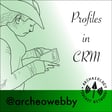Become a Creator today!Start creating today - Share your story with the world!
Start for free
00:00:00
00:00:01

Cristian La Rosa - Episode 73
Profiles in CRM features short interviews with CRM professionals from all experience levels and educational levels. I ask a standard list of questions and see how each person answers them based on their experience.
Recommended
Transcript
Sponsorship and Podcast Introduction
00:00:00
Speaker
You are listening to the Archaeology Podcast Network. The Archaeology Podcast Network is sponsored by PCSJobs. APN listeners can post for free by going to archpodnet.com forward slash PCS. That's $50 off the normal price at www.archpodnet.com forward slash PCS.
Host and Interview Format
00:00:18
Speaker
This is Cristian La Rosa and you're listening to Profiles in CRM.
00:00:25
Speaker
Welcome to Profiles in CRM, Episode 73. I'm your host, Chris Webster. Profiles in CRM asks CRM professionals nine simple questions. The answer is very wildly, depending on their experience and education. Because of the nature of contract archaeology and how small this field really is, some people choose not to reveal their name or the company they work for. Stay to the end of the show to hear how you can have a chance to answer these same questions. All right, we're here on Profiles, and here's the first question.
Interview with Cristian La Rosa
00:00:49
Speaker
What is your name and who do you work for?
00:00:51
Speaker
Hi, my name is Cristian La Rosa and I'm a GIS analyst for a CRM firm called Brockington Associates. Okay. And what's the highest degree you've earned? The highest degree I've earned is a GIS graduate certificate from the University of North Dakota, but I am currently enrolled in the Geospatial Information Science and Technology Masters at NC State. Nice. And how long have you been working in CRM? I've been in CRM about nine years.
00:01:19
Speaker
Cool. Okay. And where have you worked? What states have you worked in? Most of my archaeology experience is from the Southeastern United States, but I have done some work in the Midwest and Puerto Rico. Awesome. What is the position you usually have in CRM and what is the highest position you've attained? And by that, I mean like field tech, crew chief, et cetera, et cetera.
00:01:39
Speaker
I worked as a field technician for more than five years, but I was promoted to GIS analyst after I finished my certificate program and there was an opening in my company. Okay. And what's the best thing that's happened to you that's related to being an archeologist and this can be personal or professional? Well, definitely the best thing that have happened to me related to being a CRM archeologist was meeting the person who is now my wife. Nice. And I think you have to say that pretty much.
00:02:09
Speaker
Yeah, absolutely no. She read it and she's a good answer. Nice, nice.
Cristian's Career Insights and Advice
00:02:17
Speaker
What is the biggest thing you would change that would make being a serum archaeologist better? I think it will be predictability. I think it's good to know when you start a company.
00:02:31
Speaker
what are the job steps for you to be promoted and when are you supposed to get racist and stuff like that, which makes people's life easier in the long term. Okay, so what is your career goal in CRM? Where do you see yourself in 10 years question?
00:02:53
Speaker
I think my short term career goal is I want to keep borrowing new GIS technologies and techniques from other industry, especially environmental remote sensing and apply it to the CRM industry. Awesome. All right. Final question. If you could give an undergrad thinking about a career in CRM one piece of advice, what would it be?
00:03:16
Speaker
Well, I would recommend people to go out and dig some holes and travel and keep good work ethics because it's very important because it is a very small world.
Contact and Participation Information
00:03:30
Speaker
Show notes for this and all episodes can be found on the Archaeology Podcast Network website at www.archaeologypodcastnetwork.com/. At that page you'll also find a form that you can fill out so you can be interviewed on the show. Interviews take less than 30 minutes and you don't need any special equipment. Thanks for listening and I'll see you in the field.
00:03:51
Speaker
The show is produced by Chris Webster and Tristan Boyle and was edited by Chris Webster. This has been a presentation of the Archaeology Podcast Network. Visit us on the web for show notes and other podcasts at www.archaeologypodcastnetwork.com Contact us at chrisatarchaeologypodcastnetwork.com
